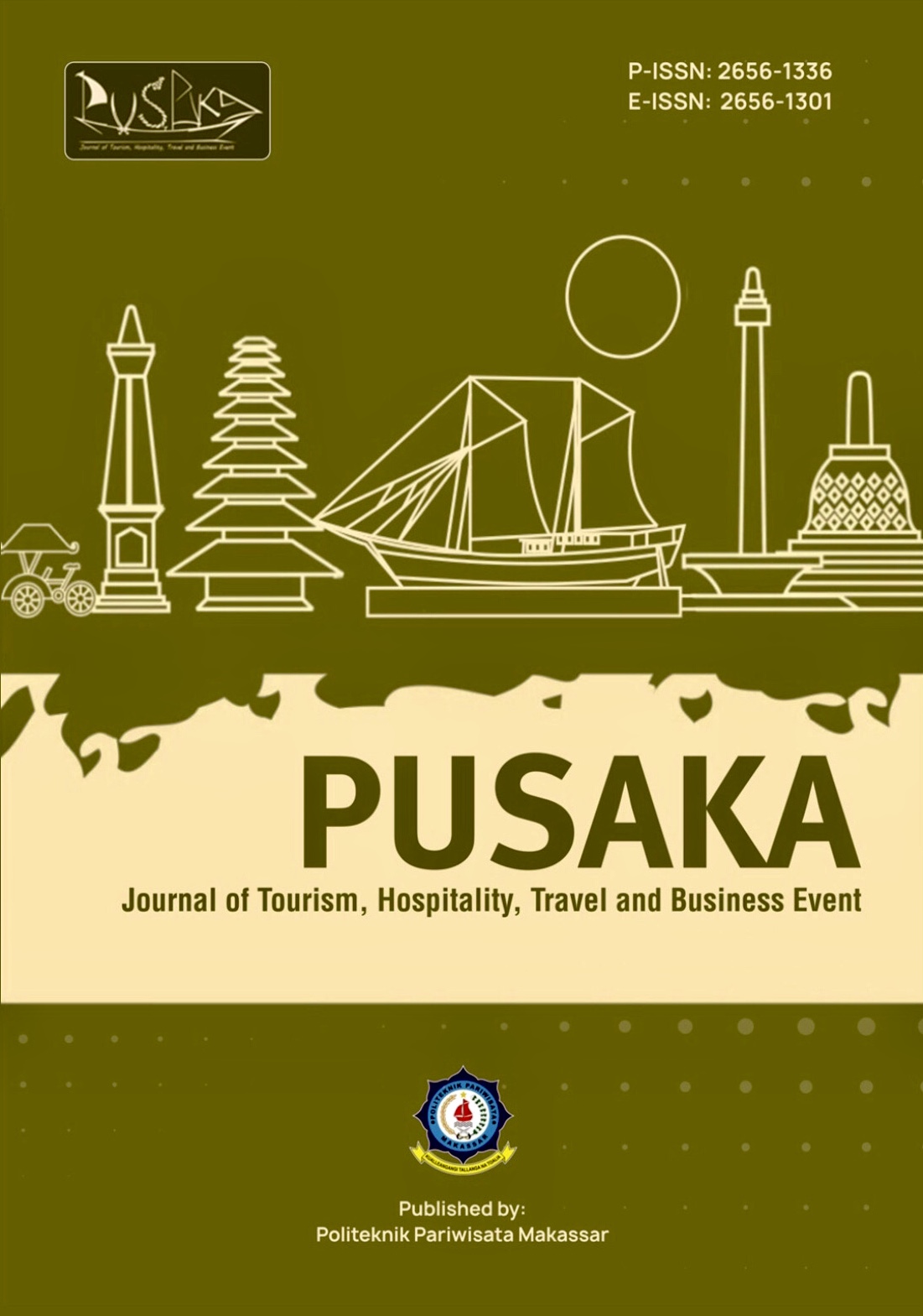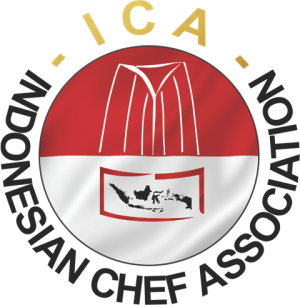Implications of the Role of Green Jobs in the Development of Low-Carbon Tourism
DOI:
https://doi.org/10.33649/pusaka.v6i1.238Keywords:
Green Jobs, Implication, Low-Carbon, TourismAbstract
Afterward, the tourism sector contributes to environmental impact. Accelerating the tourism sector’s role to achieve net zero carbon tourism activities for a higher quality experience is indispensable. Instead, there is a change in tourism trends that focus on developing sustainable tourism and implementing low carbon tourism within sustainable development, resulting in green job opportunities that positively impact economics, socio cultural, environment, and communities. Based on several previous studies, not much research has been found on the implications of the role of green jobs in developing the tourism sector in Indonesia. Qualitative literature methods such as journals, books, study reports, statistical reports, policy and regulations, and the acquisition of data and information are analyzed using the VRIO (value, rarity, imitability, and organization) approach. This will be done by identifying the issues related to low-carbon tourism and their impact on the value creation of green jobs as an enabler to support sustainable tourism, resource capacity, and competitiveness, as well as the results of the VRIO analysis to obtain strategic implications. Indonesia's low-carbon tourism sector has four key elements that can provide a sustainable competitive advantage: environmental innovation, investment in an environmentally friendly tourism industry, human resource capacity, and green skills.
References
Alonso-Almeida, M.-M., Rocafort, A., & Borrajo, F. (2016). Shedding Light on Eco-Innovation in Tourism: A Critical Analysis. In Sustainability (Vol. 8, Issue 12). https://doi.org/10.3390/su8121262
Anbumozhi, V., & Kawai, M. (2015). Toward a LowCarbon Asia: Challenges of Economic Development. In Managing the Transition to a Low-Carbon Economy: Perspectives, Policies, and Practices from Asia (pp. 11–44). Asian Development Bank Institute.
Badan Pelaksana Otorita Danau Toba. (2022). Siaran Pers: Wujudkan Komitmen Bangun Sustainable Tourism Di Kawasan TCR, Danau Toba Jadi DPSP Pertama Pengguna Green Energy. Https://Www.Bpodt.Id/Siaran-Pers-WujudkanKomitmen-Bangun-Sustainable-Tourism-DiKawasan-Tcr-Danau-Toba-Jadi-Dpsp-PertamaPengguna-Green-Energy/.
Barney, J. B. (2001). Resource-based theories of competitive advantage: A ten-year retrospective on the resource-based view. Journal of Management, 27(6), 643–650. https://doi.org/10.1177/014920630102700602
Barney, J. B. (2014). Gaining and sustaining competitive advantage. Pearson Higher Ed.
Barney, J. B., & Hesterly., W. S. (2015). Strategic Management and Competitive Advantage Concepts and Cases (15th ed.). Pearson Education Limited.
Battaglia, M., Cerrini, E., & Annesi, N. (2018). Can environmental agreements represent an opportunity for green jobs? Evidence from two Italian experiences. Journal of Cleaner Production, 175, 257–266. https://doi.org/https://doi.org/10.1016/j.jclepro.2017. 12.086
Bhaktikul, K., Aroonsrimorakot, S., Laiphrakpam, M., & Paisantanakij, W. (2021). Toward low-carbon tourism for sustainable development: a study based on a royal project for highland community development in Chiang Rai, Thailand. Environment, Development and Sustainability, 23(7), 10743– 10762. https://doi.org/10.1007/s10668-020-01083-4
Can, H., & Hongbing, D. (2011). The model of developing low-carbon tourism in the context of leisure economy. Energy Procedia, 5, 1974–1978. https://doi.org/10.1016/j.egypro.2011.03.339
Candrea, A. N., & Hertanu, A. (2015). We are developing ecotourism destinations in Romania. A case study approach. Bulletin of the Transilvania University of Brasov. Economic Sciences. Series V, 8(2), 163.
Cecere, G., & Mazzanti, M. (2017). Green jobs and ecoinnovations in European SMEs. Resource and Energy Economics, 49, 86–98. https://doi.org/https://doi.org/10.1016/j.reseneeco.20 17.03.003
Chaabane, W., Nassour, A., Bartnik, S., Bünemann, A., & Nelles, M. (2019). Shifting Towards Sustainable Tourism: Organizational and Financial Scenarios for Solid Waste Management in Tourism Destinations in Tunisia. Sustainability, 11(13), 3591. https://doi.org/10.3390/su11133591
Consoli, D., Marin, G., Marzucchi, A., & Vona, F. (2016). Do green jobs differ from non-green jobs regarding skills and human capital? Research Policy, 45(5), 1046–1060. https://doi.org/https://doi.org/10.1016/j.respol.2016.0 2.007
Creswell, J. W., & Creswell, J. D. (2018). Research design: qualitative, quantitative, and mixed methods approaches (Fifth edit). SAGE Publications Sage CA: Los Angeles, CA.
Dell’Anna, F. (2021). Green jobs and energy efficiency are strategies for economic growth and reducing environmental impacts. Energy Policy, 149, 112031. https://doi.org/https://doi.org/10.1016/j.enpol.2020.1 12031
Deschenes, O. (2015). Green Jobs. In J. D. B. T.-I. E. of the S. & B. S. (Second et al. (Ed.), International Encyclopedia of the Social & Behavioral Sciences (Second Edition) (pp. 372–378). Elsevier. https://doi.org/https://doi.org/10.1016/B978-0-08- 097086-8.94025-X
Dewi, R., & Maruf, A. (2017). Analisis Penciptaan Green Jobs (Pekerjaan Hijau) di Indonesia Menggunakan Model Skenario Investasi Hijau. Journal of Economics Research and Social Sciences, 1(1), 53– 64. https://doi.org/https://doi.org/10.18196/jerss.v1i1.90 59
Dimoska, T., & Trimcev, B. (2012). Competitiveness Strategies for Supporting Economic Development of the Touristic Destination. Procedia - Social and Behavioral Sciences, 44, 279–288. https://doi.org/https://doi.org/10.1016/j.sbspro.2012. 05.031
Economist Intelligence. (2022). Tourism Outlook 2023 Turbulence in the travel industry. European Commission. (2018). Flash Eurobarometer 456: Small and Medium Enterprises, Resource Efficiency and Green Markets (Report).
European Investment Bank. (2021). Flights, meat, and video streaming: What people in the EU, the US, and China are willing to give up to fight climate change. G20 Indonesia. (2022).
G20 Bali Leaders’ Declaration. International Labour Organization. (2007). Green Jobs: Climate Change in the world of work. World of Work Magazine, No. 60, August 2007, 1–48.
International Labour Organization. (2011). Skills For Green Jobs A Global View: Synthesis Report Based On 21 Country Studies.
International Labour Organization. (2012a). Promoting Green Jobs and Livelihoods in Sustainable Tourism: Ecotourism and Green Homestays.
International Labour Organization. (2012b). Strategic Plan Sustainable Tourism and Green Jobs for Indonesia. International Labour Organization. (2013). Sustainable development, decent work, and green jobs.
International Labour Organization. (2016). What is a green job ? Https://Www.Ilo.Org/Global/Topics/GreenJobs/News/WCMS_220248/Lang--En/Index.Htm.
Jay B. Barney, W. S. H. (2020). Strategic Management and Competitive Advantage: Concepts, 6th edition (6th ed.). Pearson Education Limited.
Kamis, A., Mohammad Hussain, M. A., Che Kob, C. G., Nur Yunus, F. A., & Rahim, M. B. (2018). Validity and Reliability of Green Skills Instrument. Sains Humanika, 10(3-3 SE-Articles). https://doi.org/10.11113/sh.v10n3-3.1518
Kusakabe, K., Shrestha, P., Kumar, S., & Nguyen, K. L. (2015). Pathways to sustainable urban tourism: garden houses in Hue, Vietnam. International Journal of Sustainable Society, 7(3), 286. https://doi.org/10.1504/IJSSOC.2015.071298
Lee, T. (2017). The effect of clean energy regulations and incentives on green jobs: panel analysis of the United States, 1998–2007. Natural Resources Forum, 41(3), 145–155. https://doi.org/https://doi.org/10.1111/1477- 8947.12125
Lopes, J., Farinha, L., Ferreira, J. J., & Silveira, P. (2018). Does the regional VRIO model help policy-makers assess a region's resources? A stakeholder perception approach. Land Use Policy, 79, 659–670. https://doi.org/https://doi.org/10.1016/j.landusepol.2 018.07.040
Maclean, R., Jagannathan, S., & Panth, B. (2018). Overview BT - Education and Skills for Inclusive Growth, Green Jobs and the Greening of Economies in Asia : Case Study Summaries of India, Indonesia, Sri Lanka and Viet Nam. In R. Maclean, S. Jagannathan, & B. Panth (Eds.), Part of the Technical and Vocational Education and Training: Issues, Concerns, and Prospects book series (TVET, volume 27) (pp. 1–18). Springer Singapore. https://doi.org/10.1007/978-981-10-6559-0_1
Martinez-Fernandez, C., Hinojosa, C., & Miranda, G. (2010). Greening Jobs and Skills: Labour Market Implications of Addressing Climate Change.
Martínez García de Leaniz, P., & Bosque, I. (2015). Sustainability: A competitive advantage in the tourism industry. In Handbook on Tourism Development and Management.
Ministry of Environment and Forestry. (2021). Indonesia Long-Term Strategy for Low Carbon and Climate Resilience 2050.
Moreno-Mondéjar, L., Triguero, Á., & Cuerva, M. C. (2021). Exploring the association between circular economy strategies and green jobs in European companies. Journal of Environmental Management, 297(2021), 1–9. https://doi.org/10.1016/j.jenvman.2021.113437
Next Tourism Generation Alliance. (2019). Sustainability and “green” skills in hospitality - how to make a sexy concept work? Https://Nexttourismgeneration.Eu/Sustainabilityand-Green-Skills-in-Hospitality-How-to-Make-aSexy-Concept-Work/.
OECD. (2013). Green Innovation in Tourism Services. https://doi.org/https://doi.org/10.1787/5k4bxkt1cjd2- en
OECD. (2017). Employment Implications of Green Growth: Linking jobs, growth, and green policies. OECD Report for the G7 Environment Ministers.
Okorie, O., Russell, J., Cherrington, R., Fisher, O., & Charnley, F. (2022). Digital transformation and the circular economy: Creating a competitive advantage from the transition towards Net Zero Manufacturing. Resources, Conservation and Recycling, 189, 106756. https://doi.org/https://doi.org/10.1016/j.resconrec.20 22.106756
Owners, P., DeLacy, T., & Jiang, M. (2019). Transforming a tourism destination into a green economy: A policy analysis of Wakatobi Islands, Indonesia. IOP Conference Series: Earth and Environmental Science, 363(1), 012004. https://doi.org/10.1088/1755-1315/363/1/012004
Potrč, S., Čuček, L., Martin, M., & Kravanja, Z. (2021). Sustainable renewable energy supply networks optimization – The gradual transition to a renewable energy system within the European Union by 2050. Renewable and Sustainable Energy Reviews, 146, 111186. https://doi.org/https://doi.org/10.1016/j.rser.2021.11 1186
Reddy, M. V., & Wilkes, K. (2015). Tourism in the Green Economy (1st ed.). London: Routledge. https://doi.org/https://doi.org/10.4324/978131588568 1
Ree, K. van der. (2019). Promoting Green Jobs: Decent Work in the Transition to Low-carbon, Green Economies. International Development Policy | Revue Internationale de Politique de Développement, 11, 248–271. https://doi.org/https://doi.org/10.4000/poldev.3107
Rosa, P., Bento, P., & Teotónio, T. (2022). The internal competitive advantage of adventure tourism operators: An exploratory approach. Journal of Outdoor Recreation and Tourism, 39, 100555. https://doi.org/https://doi.org/10.1016/j.jort.2022.100 555
Rutkowska, M., & Sulich, A. (2020). Green Jobs on the background of Industry 4.0. Procedia Computer Science, 176, 1231–1240. https://doi.org/https://doi.org/10.1016/j.procs.2020.0 9.132
Sarkar, A. N. (2013). Promotion of eco-innovation to leverage sustainable development of eco-industry and green growth. International Journal of Ecology and Development, 25(2), 71–104. https://doi.org/10.14207/ejsd.2013.v2n1p171
Sharma, T., Chen, J., & Liu, W. Y. (2020). Ecoinnovation in hospitality research (1998-2018): a systematic review. International Journal of Contemporary Hospitality Management, 32(2), 913– 933. https://doi.org/10.1108/IJCHM-01-2019-0002
Shihata Elzek, Y., Ali Gaafar, H., & Abdelsamie, H. (2020). Evaluation of Sustainable Tourism Investment in Tourism Businesses: Evidence from Egypt. Journal of the Faculty of Tourism and HotelsUniversity of Sadat City, 4(2), 42–58.
SKSG UI & Kementerian Pariwisata dan Ekonomi Kreatif. (2021). Laporan Akhir Kajian Kesiapan Kesiapan Sumber Daya Pariwisata dan Ekonomi Kreatif di Lima Destinasi Super Prioritas.
Statista. (2021). Carbon dioxide emissions from tourismrelated transport worldwide in 2005 and 2016, with a forecast for 2030.
Strietska-Ilina, Olga; Hofmann, Christine; Durán Haro, Mercedes; Jeon, S. (2011). Skills for green jobs: a global view: a synthesis report based on 21 country studies. International Labour Office.
Su, J. (2019). Impact of tourism resource development based on low-carbon mode: a case study of Guizhou ethnic areas. Ecological Processes, 8(1), 21. https://doi.org/10.1186/s13717-019-0176-6
Sulich, A., & Sołoducho-Pelc, L. (2022). The circular economy and the creation of Green Jobs. Environmental Science and Pollution Research, 29(10), 14231–14247. https://doi.org/10.1007/s11356-021-16562-y
Tănasie, A. V, Năstase, L. L., Vochița, L. L., Manda, A. M., Boțoteanu, G. I., & Sitnikov, C. S. (2022). Green Economy—Green Jobs in the Context of Sustainable Development. In Sustainability (Vol. 14, Issue 8). https://doi.org/10.3390/su14084796
Tsai, F. M., Bui, T.-D., Tseng, M.-L., Lim, M. K., & Tan, R. R. (2021). Sustainable solid-waste management in Vietnam's coastal and marine tourism cities: A hierarchical-level approach. Resources, Conservation and Recycling, 168, 105266. https://doi.org/10.1016/j.resconrec.2020.105266
United Nations Environment Programme. (2008). Green Jobs: Towards Decent Work in a Sustainable, Low Carbon World. Kenya: United Nations Environment Programme.
Vargas-Hernández, J. G., López-Lemus, J. A., & de Jesús Morales Medrano, M. (2021). Transformational Transition of Sustainable Development Based on Circular Green Economy. An Analysis Based on the Theory of Resources and Capabilities. In Innovations and Traditions for Sustainable Development, World Sustainability Series (pp. 69–86). https://doi.org/10.1007/978-3-030-78825-4_5
Vargas-Hernández, J. G., Medrano, M. de J. M., & LópezLemus, J. A. (2020). Circular Green Economy. In Handbook of Research on Entrepreneurship Development and Opportunities in Circular Economy (pp. 21–37). https://doi.org/10.4018/978-1- 7998-5116-5.ch002
Yu-ming, W. (2010). Low-carbon Tourism: A New Mode of Tourism Development. Tourism Tribune.
Zhang, D., Zhen, Y., & Zhang, E. (2016). Research on the Models of Low-Carbon Tourism Based on Sustainable Development. Proceedings of the 3rd International Conference on Applied Social Science Research. https://doi.org/10.2991/icassr-15.2016.28
Zhu, H., Zhang, J., Zhao, L., & Jin, S. (2017). Low carbon transition and sustainable development path of the tourism industry. IOP Conference Series: Earth and Environmental Science, p. 64, 012053. https://doi.org/10.1088/1755-1315/64/1/012053
Downloads
Published
How to Cite
Issue
Section
License

This work is licensed under a Creative Commons Attribution-ShareAlike 4.0 International License.






















